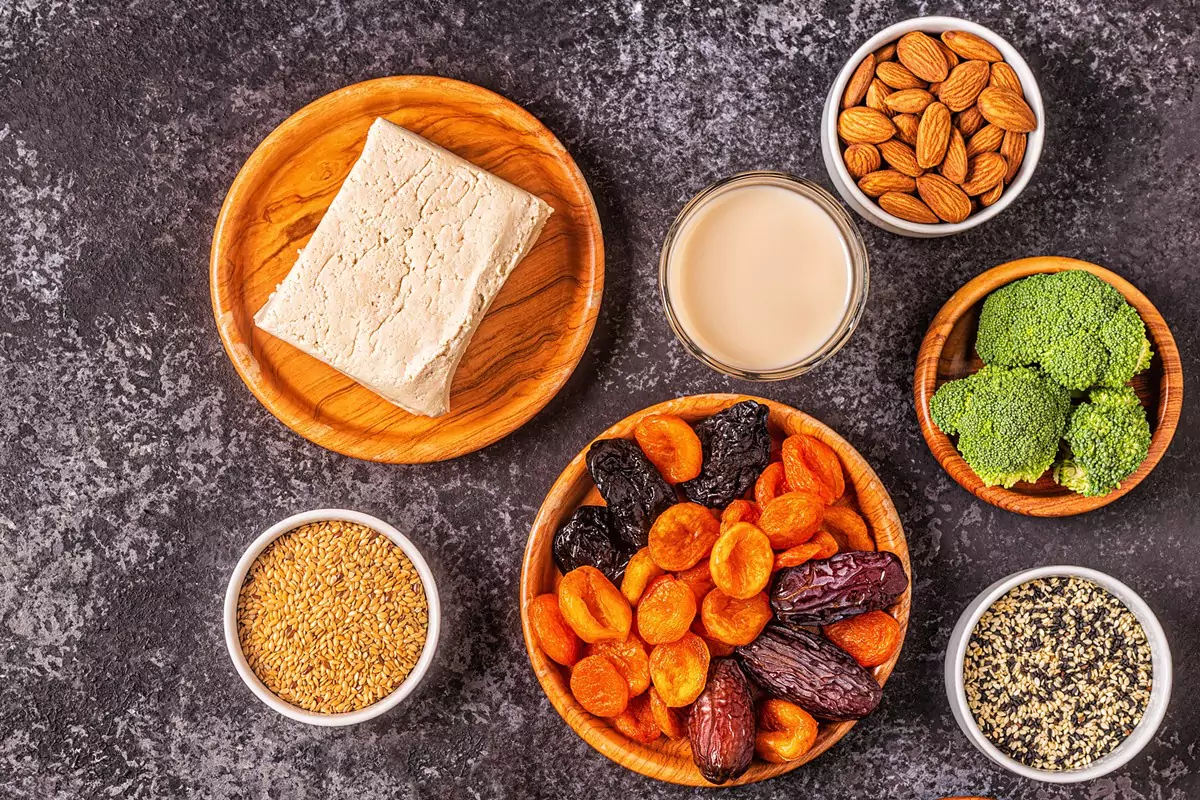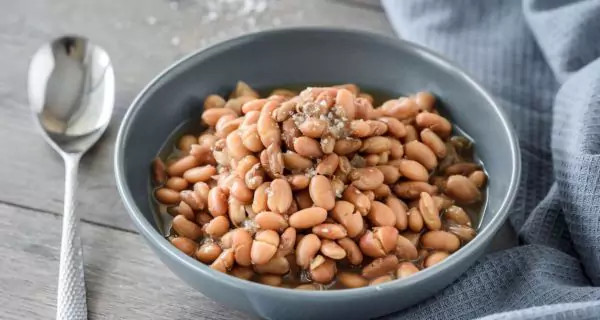Last Updated on: 30th December 2025, 06:31 am
Calcium plays a key role in keeping our bones and teeth strong. While dairy products are a well-known source, they are not the only option.
For those who avoid dairy due to lactose intolerance, allergies, vegan diets, or personal preference, there are plenty of foods high in calcium that are not dairy. These alternatives can help you meet your daily calcium needs naturally and effectively.
In this article, you’ll discover why calcium is important, who may need non-dairy options, and a variety of delicious foods high in calcium that are not dairy to support your overall health.
What is calcium and why do we need it?
Calcium is the most abundant mineral in the human body, and it plays a major role in keeping us healthy. About 99% of it is stored in our bones and teeth, giving them strength and structure. The remaining 1% helps with many other important functions throughout the body.
Main benefits of calcium for the body
While it’s mostly known for its role in bone health, calcium does much more. Here are some of its key benefits:
- builds and maintains strong bones and teeth.
- supports muscle function, including heart contractions.
- helps nerves send signals throughout the body.
- plays a role in blood clotting, which prevents excessive bleeding.
- assists in hormone and enzyme regulation.
- contributes to the overall structure and stability of the body.
In short, calcium is essential not just for your skeleton, but also for your heart, muscles, nerves, and more.
Why calcium matters for oral health
While we often talk about calcium in the context of bones, it’s just as crucial for oral health. The enamel, which is the hard outer layer of our teeth, is made largely of calcium and phosphate. When calcium levels are adequate, enamel remains strong and resistant to cavities and erosion.
Other benefits in oral health:
- supports healthy jawbones, which hold your teeth in place.
- promotes proper tooth development and eruption in children.
- helps prevent tooth loss and gum problems in adults.
- helps prevent bone loss in the jaw as you get older.
- improves the stability of dental implants and dentures by preserving the supporting bone.
In short, getting enough calcium is essential for maintaining a strong and healthy smile at every stage of life.
Signs of calcium deficiency
Calcium deficiency, also called hypocalcemia, often goes unnoticed until it causes real problems, both in the mouth and in your overall health.
In your mouth, deficiency may lead to:
- weakened enamel, making teeth more sensitive or prone to cavities
- swollen or bleeding gums
- tooth pain or loose teeth
- delayed tooth eruption in kids
- bone loss in the jaw
In the rest of your body, symptoms may include:
- fatigue or constant tiredness
- muscle cramps or spasms
- tingling or numbness in fingers or around the mouth
- brittle nails
- irregular heartbeat
- in severe cases: bone fractures, osteoporosis, or seizures
People with low calcium levels may not notice these signs for years, since the body often “borrows” calcium from the bones to keep vital functions going.
Who needs foods high in calcium that are not dairy?
While anyone can benefit from getting calcium from a variety of foods, some people need non-dairy options, such as:
- People with lactose intolerance: They can’t properly digest the sugar in milk, leading to bloating or discomfort.
- Vegans or plant-based eaters: They avoid all animal products, including dairy, and must rely on plant-based or fortified foods.
- People with milk allergies: These individuals can have serious immune reactions to milk proteins and must avoid dairy completely.
- Those with kidney disease: Certain kidney conditions require limiting nutrients found in dairy products, so plant-based alternatives may be a better fit.
- Postmenopausal women and older adults: This group tends to lose bone density faster and may need more calcium, especially from gentle, non-dairy sources that are easier to digest.
Best foods high in calcium that are not dairy
Our bodies need calcium every day to keep our teeth, bones, and muscles strong. The general recommendation is about 1,000 mg per day for most adults, and up to 1,200 mg for older adults.
Not getting enough calcium can lead to weakened bones, tooth problems, and even increase the risk of osteoporosis. But too much calcium can also be harmful; it may cause kidney stones and other health issues.
The good news is that you don’t need to rely on milk, cheese, or other dairy products to meet your calcium needs. Plenty of non-dairy foods naturally contain calcium, and not just calcium. Many also provide fiber, healthy fats, vitamins, and minerals that support overall health.
Let’s take a look at some of the best foods high in calcium that are not dairy and how they can help you build a stronger body from the inside out:
1. Leafy green vegetables
Leafy greens like kale, collard greens, and bok choy are fantastic plant-based sources of calcium. They’re not only rich in calcium but also high in vitamins A, C, and K, and fiber, which benefit the immune system and digestion.
- Kale (1 cup, cooked) – 177 mg
- Collard greens (1 cup, cooked) – 268 mg
- Bok choy (1 cup, cooked) – 160 mg
Tip: These greens contain natural compounds called oxalates, which can block calcium absorption. Cooking them helps lower oxalate levels, making the calcium easier for your body to use.
2. Almonds and other nuts
Nuts, especially almonds, are a tasty and satisfying source of calcium. They’re also high in magnesium, healthy fats, and protein, which all support bone and heart health.
- Almonds (1 oz, about 23 nuts) – 76 mg
- Brazil nuts (1 oz) – 45 mg
- Hazelnuts (1 oz) – 56 mg
Tip: Enjoy a handful of nuts as a snack or add them to oatmeal and salads. Just be mindful of portion sizes due to their calorie density.
3. Seeds: sesame, chia, and flaxseeds
Seeds may be tiny, but they’re mighty when it comes to mineral content. They’re especially high in calcium, magnesium, phosphorus, and omega-3 fatty acids.
- Chia seeds (1 oz) – 179 mg
- Sesame seeds (1 tbsp) – 88 mg
- Flaxseeds (1 tbsp) – 26 mg
Tip: Sprinkle them on smoothies, toast, yogurt, or baked goods for an easy and nutritious boost.
4. Tofu and soy products
Soy-based products are versatile, protein-rich, and often fortified with calcium. Tofu, when made with calcium sulfate, becomes an especially dense source of this mineral.
- Firm tofu (1/2 cup, calcium-set) – 400–600 mg
- Edamame (1 cup, cooked) – 98 mg
- Soy milk (1 cup, fortified) – 300–400 mg
Tip: Not all soy products contain added calcium. Check the label to be sure you’re getting the benefits.
5. Beans and lentils
Legumes are budget-friendly, filling, and packed with nutrients like fiber, plant-based protein, and calcium.
- White beans (1 cup, cooked) – 161 mg
Chickpeas (1 cup, cooked) – 80 mg - Black beans (1 cup, cooked) – 60 mg
Tip: Soak them before cooking to reduce compounds that block mineral absorption, making it easier for your body to get the most out of each bite.
6. Fortified plant-based milks and juices
Many plant-based milks and juices are enriched with calcium, often matching or even exceeding what you’d find in cow’s milk.
- Almond milk (1 cup, fortified) – 450 mg
- Orange juice (1 cup, fortified) – 350 mg
- Oat milk (1 cup, fortified) – 300 mg
Tip: Shake the carton before pouring, fortified calcium can settle at the bottom!
7. Figs and dried fruits
Dried fruits offer a naturally sweet way to get more calcium, and figs are one of the best fruit sources. They also provide fiber and antioxidants.
- Figs (5 medium, dried) – 135 mg
- Prunes (1 cup) – 75 mg
Tip: Pair them with nuts for a satisfying snack that’s rich in nutrients and calcium.
8. Seaweed and algae
Sea vegetables are less common in Western diets but are rich in minerals, including calcium, iodine, and iron.
- Wakame (1 cup, raw) – 126 mg
- Nori (10 sheets) – 70 mg
Tip: Use them in soups, rice dishes, or homemade sushi rolls to add flavor and nutrients at once.
As you can see, milk isn’t the only way to get calcium. There are plenty of tasty, healthy, and natural options out there. Just choose the ones you enjoy the most and give your bones and teeth the support they need—no dairy required.
How to help your body absorb calcium better
It’s great to eat foods that are high in calcium, but that’s just one part of the story. Your body also needs to be able to absorb and use that calcium properly.
Here are a few simple tips to help you get the most out of it:
- Soak up some sunshine (or get your vitamin D): Your body needs vitamin D to absorb calcium. A little time in the sun each day can help, or you can get it from foods like fish, eggs, mushrooms, and fortified plant-based milks, cereals, or juices.
- Watch your caffeine and salt intake: Drinking too much coffee or eating very salty foods can cause your body to lose calcium faster. No need to cut them out completely, just try to enjoy them in moderation.
- Eat calcium with meals: Your body absorbs calcium better when it’s eaten with other foods, especially during your main meals.
- Cook certain greens: Some leafy greens, like spinach, have compounds that make calcium harder to absorb. Cooking them helps break them down so your body can take in more of the good stuff.
- When in doubt, ask for help: If you have a medical condition, trouble absorbing nutrients, or are on medication, it’s always a good idea to check with a doctor or a dietitian. They can guide you on what’s best for your body.
Conclusion
Calcium is key for strong bones, healthy teeth, and proper muscle and nerve function. And the good news is that you don’t need dairy to get enough of it.
By adding leafy greens, nuts, seeds, beans, tofu, and fortified plant-based products to your meals, you can meet your calcium needs naturally. Just remember to pair these foods with vitamin D and keep a healthy lifestyle for better absorption.
Whether you’re vegan, lactose intolerant, or just looking for variety, foods high in calcium that are not dairy are a simple and delicious way to care for your body and your smile.
Frequently Asked Questions
How can I naturally strengthen my teeth without using dairy?
You can strengthen your teeth by combining non-dairy calcium sources (like leafy greens, tofu, seeds, and fortified plant milk) with foods that support mineral absorption, especially those rich in vitamin D, magnesium, and vitamin K2. At the same time, try to avoid excess sugar and acidic drinks. Practicing daily oral hygiene, using fluoride toothpaste, and visiting the dentist regularly are just as important as diet.
Does drinking soda affect calcium and teeth?
Yes. Sodas, especially colas, are often high in phosphoric acid and sugar, both of which can weaken enamel and leach calcium from bones and teeth. In addition, caffeine in soda may reduce calcium absorption. Regular soda consumption is linked to higher risks of tooth decay, bone loss, and gum disease, particularly if oral hygiene is poor.
What’s better: eating calcium throughout the day or all at once?
Do calcium needs change as we age?
Can you get too much calcium from fortified foods?
Share
References
1. Barhum, L. (2023, 21 July). Calcium-rich foods that vegans can eat. https://www.medicalnewstoday.com/articles/322585
2. DGA. (2019). Food Sources of Calcium. Dietary Guidelines for Americans. https://www.dietaryguidelines.gov/food-sources-calcium
3. Hood, S. (2018). Plant Based Sources of Calcium. Dorset County Hospital NHS Foundation Trust. https://dchft.nhs.uk/leaflets/plant-based-sources-of-calcium/
4. Jennings, K. A., Ajmera, R. (2023, 8 December). Top 15 Calcium-Rich Foods (Many are nondairy). Healthline. https://www.healthline.com/nutrition/15-calcium-rich-foods
5. University of Rochester Medical Center. (s. f.). Non-Dairy Sources of Calcium. Pediatric Nutrition – Golisano Children’s Hospital. https://www.urmc.rochester.edu/childrens-hospital/nutrition/calcium
-
Dr. Yeidy Carolina Mesa [Author]
DDS Yeidy Carolina Mesa Passionate Dentist | Advocate for Accessible Oral Health Education Graduating from Universidad CES in 2022, I am a dedicated general dentist with a lifelong passion for helping others and making a meaningful impact in the world. My journey into dentistry began at the age of 7, inspired by my own experience with braces and overcoming a fear of the dentist. This personal journey shaped my mission to help patients conquer their own dental anxieties and embrace a healthier,...
View all posts
-
Nayibe Cubillos M. [Medical Reviewer]
Pharmaceutical Chemestry |Pharmaceutical Process Management | Pharmaceutical Care | Pharmaceutical Services Audit | Pharmaceutical Services Process Consulting | Content Project Manager | SEO Knowledge | Content Writer | Leadership | Scrum Master
View all posts
A healthcare writer with a solid background in pharmaceutical chemistry and a thorough understanding of Colombian regulatory processes and comprehensive sector management, she has significant experience coordinating and leading multidisciplina...























